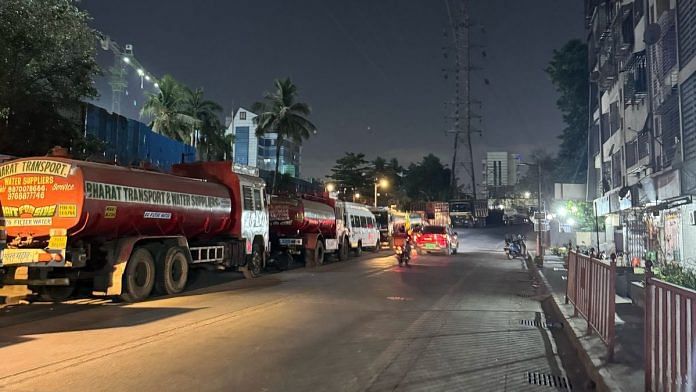Mumbai: Four days after it halted supply, putting thousands of Mumbaikars in a tough spot, Mumbai Water Tanker Association (MWTA) Monday called off its strike after a meeting with Bhushan Gagrani, commissioner of the Brihanmumbai Municipal Corporation (BMC).
Rajesh Thakur, general secretary of MWTA, told ThePrint that water tanker services are being restored on an immediate basis. The association conveyed its concerns to the authorities and they assured us of their cooperation, said Thakur.
The previous evening, BMC had used emergency powers under sections 34 (a) and 65 (1) of The Disaster Management Act, 2005 to requisition private water tankers, wells and borewells within the city limits. Thakur said MWTA reacted to the move by opening a line of communication with Chief Minister Devendra Fadnavis who, in turn, told the association to convey its concerns to the BMC commission and reach an understanding.
The MWTA controls around 1,800 registered water tankers with individual capacity ranging from 500-20,000 litres. These tankers supply around 350 megalitres per day (MPD) to different parts of Mumbai. BMC, at the same time, supplies nearly 3,900 MLD.
On 10 April, MWTA had launched an indefinite strike in response to BMC issuing notices to owners of private wells that supply water to the tankers.
In the notices, owners of private wells were instructed to get a no-objection certificate from CGWA. They also laid down other mandatory requirements: 200 square metres of land, proof of lease or ownership of the well, installation of digital water flow metre, adherence to Bureau of Indian Standards (BIS) norms and accurate measurement of daily intake.
“Gagrani (BMC commissioner) assured us that whatever notices were issued will be revoked and new notices will not be issued until our talks with CGWB (Central Ground Water Board) conclude,” said Thakur.
MWTA chairman Jasbir Singh also told ThePrint that BMC penalises drivers and cleaners during their rounds and that this has to stop.
After MWTA went on strike, BMC assured the association that notices already issued to owners of private wells would be stayed till 15 June following intervention by CM Fadnavis and Union Minister of Jal Shakti C.R. Paatil.
But MWTA demanded that the rules be amended immediately.
On Friday, MWTA representatives met Paatil along with BMC and CGWA officials to find a “golden mean” but no understanding was reached.
Also Read: Delhi’s tanker mafia begins from Jal Board borewells—pipes, profits, politics
Strain on residents & BMC’s SOP
The MWTA strike affected water supply to residential societies who largely depend solely on water tankers for their needs.
For instance, Manoj Keni who lives in a high-rise in Sion told ThePrint that while there is almost always a shortage of water during summer seasons, residents managed with the help of private water tankers. “But this year even the summer kicked in early. There were heatwaves last month and this month too, temperatures are soaring. BMC water is very slow these days and supply is cut by afternoon. So, we used to rely on tankers. But with no tankers, these last few days, especially the weekend, were strained.”
In the press statement it issued Sunday to announce its decision to requisition private tankers, BMC said it would manage supply of water through water tankers with the help of its ward officials, along with Mumbai Police and the transport commissionerate.
It also spoke of a standard operating procedure (SOP) to streamline water supply to private housing societies and other stakeholders.
According to the SOP, BMC’s legal and disaster management departments would jointly issue a notification order to requisition water tankers along with drivers, cleaners and office staff from the tanker operator’s office.
“Thereafter, Maharashtra transport commissioner will do requisition of the vehicles and personnel and deploy them to ward-level teams on Sunday evening, while ward officers will form a team comprising officials from the water works, pest control, health, accounts, RTO and local police departments, to ensure ward wise smooth water supply,” it said.
The SOP went further to say that a team from each ward would accept tanker requisitions from societies at citizen facilitation centres (CFCs), receive payments, issue receipts, and dispatch tankers accordingly.
Each filling point, it added, would be granted police protection and payments made by housing societies would reflect market rates plus 25 percent administrative charges, payable via cash or UPI.
(Edited by Amrtansh Arora)
Also Read: ‘Court can appoint independent committee on water supply and usage in Delhi,’ Delhi govt tells SC






